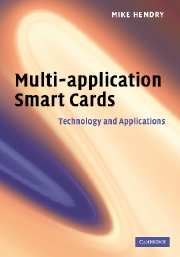Book contents
- Frontmatter
- Contents
- Foreword by Kevin Gillick
- Acknowledgements
- Part I Introduction
- Part II Technology
- Part III Business requirements
- 13 Common business requirements
- 14 Telecommunications
- 15 Banking
- 16 Transportation
- 17 Government and citizens' cards
- 18 Campus cards and closed user groups
- Part IV Implementation
- Appendix A Glossary
- Appendix B Further reading
- Appendix C Standards
- Index
- References
15 - Banking
from Part III - Business requirements
Published online by Cambridge University Press: 11 August 2009
- Frontmatter
- Contents
- Foreword by Kevin Gillick
- Acknowledgements
- Part I Introduction
- Part II Technology
- Part III Business requirements
- 13 Common business requirements
- 14 Telecommunications
- 15 Banking
- 16 Transportation
- 17 Government and citizens' cards
- 18 Campus cards and closed user groups
- Part IV Implementation
- Appendix A Glossary
- Appendix B Further reading
- Appendix C Standards
- Index
- References
Summary
Cards are now the payment instrument that banks prefer customers to use for spontaneous transactions. They are gradually replacing (in some countries, have replaced) cheques and other paper instruments for these transaction types, and even have a rôle to play in many regular or business transactions.
Using a card removes a manual process (capturing the transaction details) and with it the scope for errors that any manual process offers. Cards help customers to use lower-cost channels (such as ATMs and the internet) and, in the case of smart cards, also actively help in managing many risks: by forcing the user to authenticate him- or herself, by managing transaction ‘velocities’ – i.e., the rate of spending – and by offering the merchant or acceptor the opportunity to verify the identity of the bank or its membership of a valid card scheme. In some cases the card acts as the agent of the bank, authorising or cryptographically signing transactions on the bank's behalf.
There is also a marketing and psychological side to the bank–card-holder relationship: the card carries the bank's brand and is the permanent reminder in the customer's pocket. In a competitive business, where customers may have accounts with many banks, the card that is ‘front of wallet’, i.e., used most often, identifies the bank that has raised the level of its relationship from pure account-holding to that of a preferring customer.
- Type
- Chapter
- Information
- Multi-application Smart CardsTechnology and Applications, pp. 144 - 162Publisher: Cambridge University PressPrint publication year: 2007



